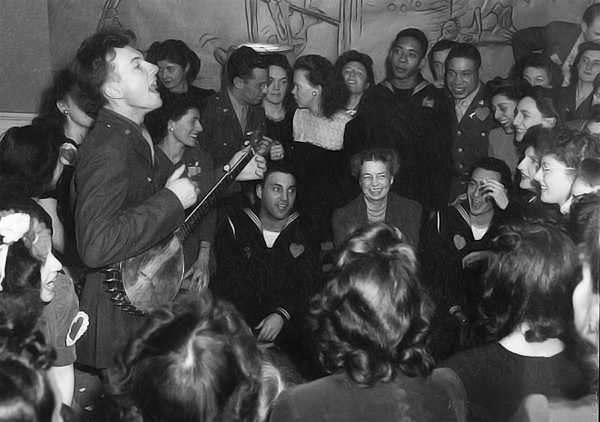
Eleanor Roosevelt is front and center as US Army Corporal Pete Seeger opens the Washington labor canteen, a celebration sponsored by the Federal Workers of America, and Congress of Industrial Organizations (CIO). Circa 1944.
Library of Congress, Prints & Photographs Division, FSA/OWI Collection, [reproduction number, LC-USW3-040956-D (b&w film neg.)] Retouched by EarthDesk.
On August 18, 1955, in hot, crowded Room 1703 of the Foley Square federal building in New York City, Pete Seeger refused to testify before the House Un-American Activities Committee (HUAC) about anything but his music. HUAC was on the hunt for disloyal Americans. Because Pete performed at events such as the integrated labor celebration above, albeit as an Army corporal, he was one of thousands of citizens subpoenaed or investigated.
A front-page article in The New York Times of August 10, 1955, “27 Entertainers Face Red Inquiry,” provides a glimpse at the often snide slant of the era’s news media.
The inquiry is designed to determine whether Communist propaganda has penetrated to American audiences seeking relaxation and not Red ideologies.
For his refusal to answer committee questions, Pete was charged with contempt and sentenced to a year in prison. His young, rising career was then cut short when the entertainment industry blacklisted him for the next decade. He was 36.
Eleanor Roosevelt made note of his case in her diary:
He lives not far from me near Beacon, N. Y., and is loved by many people, young and old, who have enjoyed his music. The accusation against him was that he had performed before very questionable, even Communist, groups—although I doubt that Seeger, like most performers, could list the innumerable people before whom he has played and sung. He has refused to take the Fifth Amendment because he felt that could be construed as an admission of guilt, and chose instead to invoke the freedoms of the First Amendment.
At one point in his testimony, Pete replied to a personally probing inquiry by the committee chair, “Sir, I refuse to answer that question whether it was a quote from the New York Times or the Vegetarian Journal.” But Pete never thought of his actions at the hearing as particularly courageous. In 1962 he was exonerated of the contempt charges. He told me that in retrospect he should have refused HUAC’s subpoena.
The excerpts below are taken directly from his sworn testimony. Those who knew Pete will recognize in that brave 36 year-old the very same Pete at 94. His full testimony is here.
I am not going to answer any questions as to my association, my philosophical or religious beliefs or my political beliefs, or how I voted in any election, or any of these private affairs. I think these are very improper questions for any American to be asked, especially under such compulsion as this. I would be very glad to tell you my life if you want to hear of it.
. . . I feel that in my whole life I have never done anything of any conspiratorial nature and I resent very much and very deeply the implication of being called before this Committee that in some way because my opinions may be different from yours, or yours, Mr. Willis, or yours, Mr. Scherer, that I am any less of an American than anybody else. I love my country very deeply, sir.
. . . I have sung for Americans of every political persuasion, and I am proud that I never refuse to sing to an audience, no matter what religion or color of their skin, or situation in life. I have sung in hobo jungles, and I have sung for the Rockefellers, and I am proud that I have never refused to sing for anybody.
. . . I am proud of the fact that my songs seem to cut across and find perhaps a unifying thing, basic humanity,and that is why I would love to be able to tell you about these songs, because I feel that you would agree with me more, sir. I know many beautiful songs from your home county, Carbon, and Monroe, and I hitchhiked through there and stayed in the homes of miners.
. . . I love my country very dearly, and I greatly resent this implication that some of the places that I have sung and some of the people that I have known, and some of my opinions, whether they are religious or philosophical, or I might be a vegetarian, make me any less of an American.









